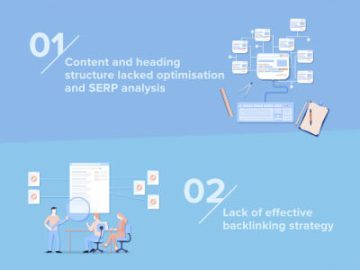Financial advisors often need to stand out, a task that isn’t easy to do when you can be one of dozens or even hundreds in an area.
Tech-savvy advisors may turn to search engine optimization techniques to drive traffic and reach potential clients through Google searches, but experts say the problem is that many advisors are unaware of this fact. Or, if they are, they are filling their websites with useless content that is causing them to be downgraded in search functions.
A recent SmartAsset study analyzed 20 websites of the fastest-growing RIAs, and found that only two of them, Cetera Investment Advisors and Strategic Wealth Investment Group, have noteworthy monthly organic traffic.
Standing out in a crowded field
Olivia Tapper, chief operations officer of DTC SEO Agency, said it is extremely difficult to rank for the term “financial advisor” as it’s a very competitive keyword.
“If you’re starting and your website isn’t that powerful yet, you’ll see a quicker return on investment if you focus on more long-tail keywords, those who’ve lower competition but still hundreds in monthly search volumes,” she said.
Tapper said this could be the term “financial advisor” and another word that is a bit more niche. For instance, “financial advisor tampa,” “small business financial advisor,” “financial advisor for debt” or “divorce financial advisor.”
Justin Abrams, co-founder and CEO of boutique web agency Cause of A Kind said while SEO is often overlooked, “it’s a huge opportunity.”
“People are searching for terms like ‘financial advisor near me’ every single day, and advisors who focus on SEO can stand out,” he said. “It’s about being visible when potential clients need you.”
READ MORE: From LinkedIn to Reddit, the social media strategies that work for advisors
Abrams said SEO isn’t just about traffic numbers, it’s about making sure the right people find you.
“Advisors can see significant growth if they align their content with what prospective clients are already searching for,” he said.
Said Israilov, a financial planner and wealth manager at Israilov Financial in San Francisco, said this year he engaged a digital marketing firm to help him with SEO for his website.
“It took a lot of time and effort to enhance my digital footprint and increase my local website ranking,” said. “The SEO work helped increase traffic to my website, which in turn helped book more prospect meetings.”
Israilov said what helped the most was focusing on distinct, less-competitive keywords to bring relevant prospects to his website.
“These keywords were used across various parts of my website, particularly in my blog content,” he said. “I learned that SEO is both an art and a science and that it’s a never-ending effort to bring relevant web traffic.”
Website structure is fundamental
Vincent D’Eletto is currently an advisor and operating manager of Investment Insight Wealth Management in South Farmingdale, New York, but before that, he founded WordAgents.com, an SEO content writing service. At his current firm, he is redesigning the website to ensure that every individual web page targets a specific keyword that is both relevant and likely to draw in the target demographic.
This included extensive keyword research, wireframing (redesigning the structure) of each page and “writing copy that both satisfies what search engines are seeking to rank well and directly addresses the needs of our target demographic to increase the likelihood of booking a meeting via the website.”
“My extensive experience in SEO tells me that a well-optimized website will absolutely drive leads,” he said. “The number of leads derived from an SEO-focused website is dependent on the target location. A website targeting clients in Manhattan will probably generate more leads than one targeting a small city in rural Alabama. It’s all about the demand and means of the local population.”
READ MORE: Clients want more from financial services apps, websites
Abrams said many advisor websites aren’t set up to guide visitors effectively.
“Making sites more mobile-friendly, improving loading speed and ensuring content speaks directly to client concerns can make all the difference,” he said.
Tapper said the way pages are set up is important because when Google crawls the website, it looks at URLs, then titles, called “H1s,” and the overall hierarchy. She said advisors should ensure their websites are technically sound, for instance, don’t have dead pages (404s), aren’t slow to load and have multiple H1 tags. Advisors should also ensure they have proper internal linking.
“That’s why having the keyword in the URL and in the title is critical,” she said.
READ MORE: Dislike and unsubscribe: Advisors on combating misleading social media advice
D’Eletto said prospects can also find the firm in a variety of other ways such as Google Local Service Ads, directories like Wealthtender and organic social media marketing. He said the general strategy includes attracting ideal clients through the selection and implementation of strategically selected keywords that they would use to find a service like theirs.
“Once they land on our site, every single page is designed to earn their trust and drive their attention to a form where they can provide some information about their needs and book a virtual meeting on the spot,” he said. “SEO is all about iterative improvements. This can include building out new pages around newly found, viable keywords to attract more targeted traffic, split testing various elements of the website and offering different types of value via lead magnets, downloadables and other types of content that will build trust.”
Favoring quality over quantity to boost SEO
Tapper said advisors should avoid using AI tools to create website texts and instead hire skilled editors.
“AI tools tend to create a lot of fluff that isn’t good for user experience,” she said. “Google decides whether you’ll rank or not based on the user experience. The algorithm favors a website with good user experience.”
Tapper said if advisors use an agency to help build their website, they will generally emphasize link-building and blog articles.
“With link-building it’s quality over quantity,” she said. “If they say they can build you 40 links per month for a couple of grand, they’ll likely provide low-quality and spammy links. Over time, these links can damage your website. Links act as a vote of confidence in Google’s eyes. If you have a lot of shady links, Google will stop trusting your website. If you have a lot of quality links, Google will start favoring your website.”
Clients have approached Tapper after their websites tanked, and she said her firm has identified an abundance of toxic links as the cause.
“Therefore, ask the agency how they ensure they build quality links,” she said.
When it comes to blog articles, Tapper said it’s easy to find answers on AI search these days, but content can still be helpful to build up your domain relevance and topical authority.
“If you want to create blogs, analyze keywords that are in the right part of your funnel, so it’s strategically guiding them toward your services and embed a call-to-action,” she said. “Address different pain points that would lead to your service as a solution.”





